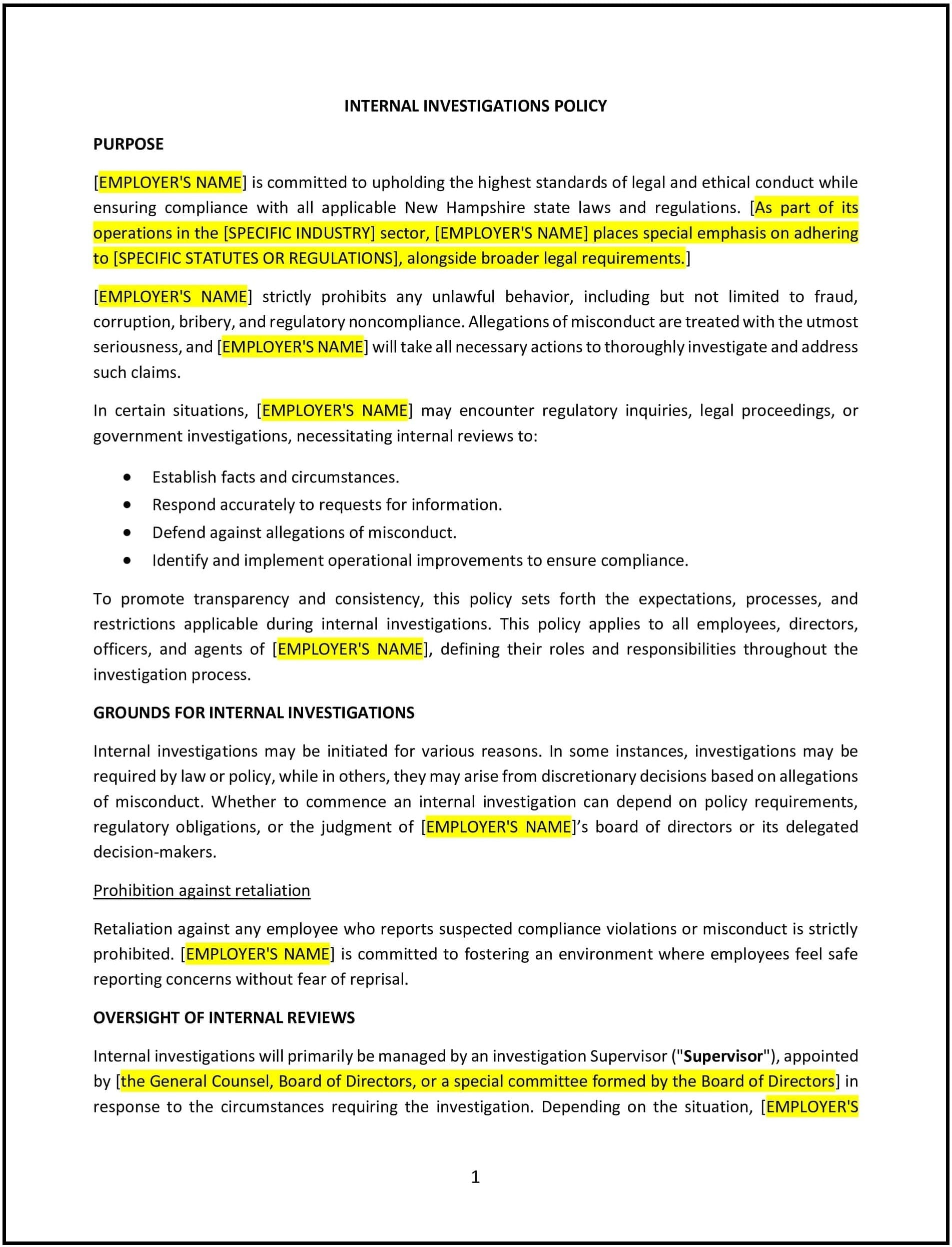Internal investigations policy (New Hampshire): Free template
Got contracts to review? While you're here for policies, let Cobrief make contract review effortless—start your free review now.

Customize this template for free
Internal investigations policy (New Hampshire)
An internal investigations policy helps New Hampshire businesses handle complaints, allegations, and incidents involving employee misconduct, fraud, harassment, or other serious violations of company policy. This policy outlines the procedures for conducting thorough, impartial investigations, protecting confidentiality, and taking appropriate actions based on the findings.
By adopting this policy, businesses in New Hampshire can manage internal issues effectively, maintain a fair and transparent process, and ensure that all employees are treated equitably while safeguarding the organization’s interests.
How to use this internal investigations policy (New Hampshire)
- Define the scope of investigations: Clearly outline the types of issues or violations that may trigger an internal investigation, including misconduct, fraud, discrimination, harassment, and other breaches of company policy.
- Establish reporting mechanisms: Provide employees with clear instructions on how to report concerns or allegations of misconduct, including who to contact, how to submit complaints, and the level of confidentiality they can expect.
- Assign investigators: Specify who will be responsible for conducting investigations, ensuring they are impartial, trained in investigative procedures, and have the authority to gather evidence and interview witnesses.
- Outline the investigation process: Detail the steps of the investigation, including gathering evidence, interviewing relevant parties, and maintaining confidentiality throughout the process.
- Ensure fairness and impartiality: Ensure that all parties involved in an investigation are given an opportunity to present their side and that the investigation process is impartial, objective, and free from bias.
- Protect confidentiality: Emphasize the importance of confidentiality in the investigation process, including limiting information to those directly involved and ensuring that sensitive information is handled with care.
- Implement corrective actions: Specify the actions the company may take following the conclusion of an investigation, including discipline, training, or termination, as appropriate based on the findings.
- Review and update: Regularly review and update the policy to reflect changes in New Hampshire laws, business practices, or industry standards regarding internal investigations.
Benefits of using this internal investigations policy (New Hampshire)
This policy provides several benefits for New Hampshire businesses:
- Promotes fairness and transparency: A clear internal investigations policy ensures that all employees are treated fairly and consistently during an investigation, promoting trust in the company’s processes.
- Reduces legal risk: By following a structured process, businesses reduce the risk of legal challenges related to investigations, such as claims of discrimination, retaliation, or unfair treatment.
- Protects the company’s reputation: Conducting thorough, impartial investigations helps businesses address issues promptly, reducing the potential for reputational damage.
- Improves workplace culture: A clear policy demonstrates the company’s commitment to addressing misconduct and maintaining a respectful workplace, fostering a positive organizational culture.
- Ensures compliance with legal requirements: The policy helps businesses comply with federal and state regulations related to workplace misconduct, harassment, and employee rights.
Tips for using this internal investigations policy (New Hampshire)
- Communicate the policy clearly: Ensure that employees understand how to report misconduct and what to expect during the investigation process. Regularly remind staff of their rights and the company’s commitment to a fair investigation process.
- Provide investigator training: Train employees responsible for conducting investigations on how to handle sensitive situations, gather evidence, and maintain neutrality throughout the process.
- Protect the privacy of those involved: Ensure that the confidentiality of all parties involved in an investigation is maintained, including the complainant, the accused, and any witnesses.
- Use documented procedures: Ensure that all steps of the investigation are well-documented to protect the integrity of the process and provide a record in case the findings are challenged.
- Monitor progress: Regularly check in on the status of investigations to ensure they are progressing in a timely manner and that the process remains fair and impartial.
- Review the outcome: After the investigation, review the findings and take appropriate corrective actions, such as employee discipline or process improvements, to prevent future incidents.